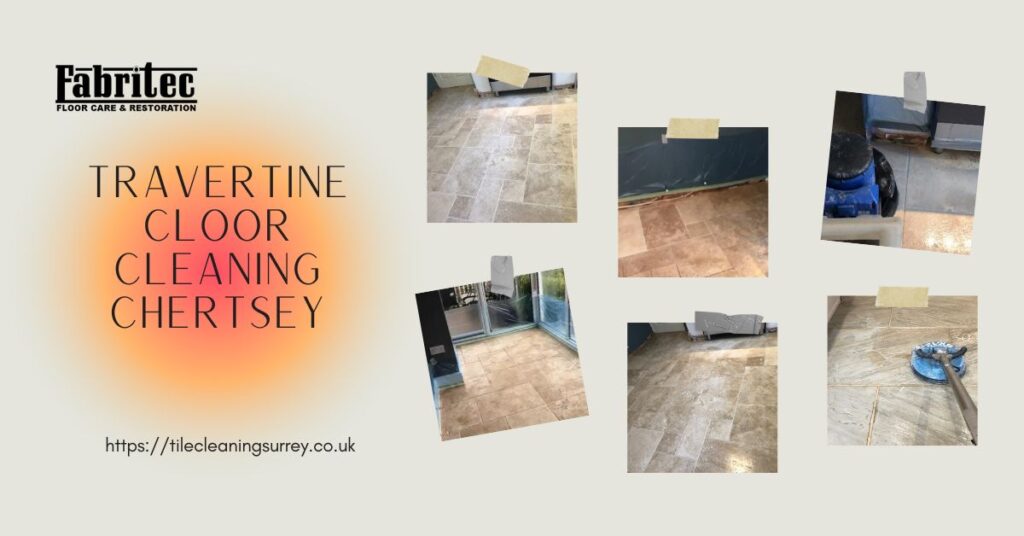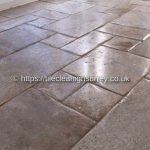
Background
Travertine floors are known for their natural beauty and unique appearance, but they require proper care and maintenance to maintain their charm over time. Recently, we had the opportunity to revitalise a well-worn travertine floor in a residential property in Chertsey, Surrey. This case study will illustrate the steps we followed to clean, repair, and seal the travertine floor, ensuring it not only looked new but also would last for years to come.
Initial Assessment and Preparation
Upon initial inspection, the travertine floor showed signs of wear, including visible dirt buildup in the grout lines, small natural holes typical of travertine stone, and some minor cracks in a few tiles. To ensure a clear workspace, we removed all furniture from the area before vacuuming up any loose debris and dust.
To protect surrounding surfaces, such as kitchen units and adjacent floors, we applied protective sheeting. This is critical in preventing any potential damage from cleaning agents or equipment during the cleaning process.
Deep Cleaning the Travertine Tiles and Grout
The key to revitalising travertine is a thorough, deep cleaning process. We started by applying a diluted, professional-grade travertine cleaner across the floor, paying special attention to grout lines and any heavily soiled areas. After allowing the cleaner to sit for about ten minutes to loosen embedded dirt, we used a rotary scrubbing machine to work the cleaner into the tiles.
This method effectively lifted the grime that had accumulated over time, leaving the surface visibly cleaner. To ensure the floor was completely clean, we followed up with pressure rinsing, a crucial step for removing any remaining cleaning slurry and debris. The rinse also eliminated any residues from previous sealers, preparing the surface for repair and sealing.
Repairing the Travertine Tiles
Upon cleaning, we discovered a few natural holes and minor cracks in the travertine tiles, common in this type of stone. To address these issues:
Filling Holes:
We filled the natural holes using high-quality beige fillers that blended well with the existing tile colour. This step not only restored the uniformity of the floor but also prevented future dirt buildup in these crevices.
Repairing Cracks
For the cracked tiles, we used a resin grout that allows for slight movement without causing additional cracks. Colour-matching the grout to the tile ensured that the repairs were almost invisible, maintaining the floor’s seamless aesthetic.
Sealing the Travertine Floor
The final, yet most critical, step in this process was sealing the travertine floor. Sealing protects the stone from stains, spills, and everyday wear and tear, thus extending the floor’s life. For this project, we applied a high-solids, breathable sealer that not only penetrated the travertine but also formed a protective barrier on the surface.
Our client preferred a satin finish, which enhanced the natural beauty of the travertine without making it overly glossy. After the sealer was applied, we allowed it to cure for several hours, ensuring the floor was ready for regular use.
Aftercare Recommendations
To maintain the travertine’s refreshed appearance, we advised the client to follow a regular cleaning routine:
- Use a pH-neutral cleaner specifically designed for sealed natural stone, such as LTP Floorshine, to avoid damaging the sealer.
- Regularly vacuum or dust the floor to prevent dirt from scratching the surface.
- Immediately clean up any spills to prevent staining.
- Reapply the sealer every 2 to 3 years, depending on foot traffic, to maintain the floor’s protection and appearance.
Outcome
After completing the cleaning, repairing, and sealing processes, the travertine floor in the Chertsey property was transformed. The floor now had a renewed lustre, the grout lines were clean, and the repaired cracks were barely noticeable. The client was delighted with the results, and the floor was protected against future damage, ensuring it would remain beautiful for years to come.
We couldn’t be happier with the results! Our travertine floor looks absolutely stunning—like it’s brand new again. The team was professional, thorough, and took great care to restore every detail. We’re thrilled with how well the repairs blend in, and the sealing has made cleaning so much easier. Highly recommend their service!
This project highlights the importance of regular professional maintenance for travertine flooring to preserve both its aesthetic appeal and functional longevity.
Frequently Asked Questions
How Often Should I Clean My Travertine Tiles?
Cleaning travertine tiles should occur regularly, ideally once or twice a week, depending on foot traffic. Additionally, deep cleaning every six months guarantees the maintenance of their aesthetic appeal and longevity. Always use appropriate cleaners.
Can I Use Vinegar to Clean Travertine Surfaces?
Using vinegar to clean travertine surfaces is not advisable, as its acidity can damage the stone and its protective seal. Instead, opt for a pH-balanced cleaner specifically formulated for natural stone to maintain its integrity.
What Are Common Signs of Travertine Damage?
Common signs of travertine damage include visible cracks, chips, discoloration, and uneven surfaces. Additionally, persistent stains or dullness indicate wear, necessitating immediate attention to maintain both the aesthetics and structural integrity of the flooring.
Is Travertine Suitable for Outdoor Use?
Travertine is suitable for outdoor use due to its durability and natural slip resistance. However, proper sealing is essential to protect it from weathering and staining, ensuring longevity and maintaining its aesthetic appeal in outdoor environments.
How Can I Prevent Future Staining on Travertine?
To prevent future staining on travertine, apply a high-quality sealer regularly, promptly clean spills, and utilise pH-neutral cleaners. Additionally, maintain a consistent cleaning routine to enhance the stone’s durability and aesthetic appeal.
The post: Travertine Cleaning Chertsey was produced by Travertine Floor Cleaning Chertsey
The Article Cleaning and Sealing a Travertine Floor in Chertsey, Surrey appeared first on https://fabritec.org
The Article Cleaning and Sealing a Travertine Floor in Chertsey, Surrey Was Found On https://limitsofstrategy.com


This case study highlights the importance of proactive maintenance for travertine floors, which are often overlooked in terms of care. It’s interesting to see how small issues, like dirt buildup in the grout and cracks, can escalate into larger problems if not addressed promptly. In my experience, similar natural stone surfaces in busy households require almost routine, gentle cleaning to prevent those unsightly marks and damage.
You bring up a really important point about proactive maintenance for travertine floors. I think many people underestimate how much wear and tear natural stone surfaces can endure, especially in a busy home environment. It’s interesting you mention dirt buildup in the grout—I’ve noticed that even with routine cleaning, it can be a relentless battle, and some people don’t realize how much it can impact the overall look of the space.
You’ve hit the nail on the head about how the wear and tear on natural stone surfaces can often be underestimated. It really is a balancing act for many homeowners. You put a lot of effort into installing that beautiful travertine, and then it can feel like a continuous uphill battle to keep it looking pristine—especially in a bustling household where life happens.
You make a great point about the nuances of caring for travertine floors. It’s easy to underestimate the maintenance they require, especially in busy households where dirt and spills are part of daily life. I’ve found that regular cleaning, as you mentioned, not only keeps the floors looking good but can also be a stress reliever. It creates a sense of order amidst the chaos of family life.
You’re so right about the balance that regular maintenance can bring, especially in a busy household. I think it’s interesting how some people view cleaning as a chore, while for others, it serves as a meditative practice. Personally, I find that when I take those few moments to care for my floors, it’s like a mini-break from the chaos.
It’s quite fascinating to read about the meticulous process involved in revitalizing travertine floors, a material that holds not just aesthetic appeal but also a rich historical significance. Travertine has been used since ancient times, notably in structures like the Colosseum and St. Peter’s Basilica. However, the modern homeowner’s relationship with it is often one of both admiration and trepidation due to the maintenance challenges associated with such natural stone.
I completely agree that travertine floors bring a unique blend of beauty and history into modern spaces. It’s fascinating to think about how this stone has witnessed such pivotal moments in history, yet here we are, navigating its challenges in our homes today.
It’s great to hear your thoughts on travertine floors. They really do offer a fascinating connection to the past. The way this stone has been used across centuries—think about ancient Roman architecture—is a remarkable testament to its durability and appeal. It’s interesting how its natural variations in color and texture tell the story of the earth itself, providing a unique character to each slab.
I completely agree with your observation about travertine. It’s not just a beautiful choice for flooring; it carries so much history and storytelling potential. Walking on travertine can almost feel like connecting with the past, as if every square foot has seen the footsteps of countless others over centuries. Maintaining it, however, does require a bit of dedication, which can put many modern homeowners off.
It’s interesting how the article delves into the intricate process of restoring travertine floors, highlighting both their timeless beauty and the practical considerations homeowners face today.
‘Reviving Travertine Floors in Chessington, Surrey’
https://ishevents.org/reviving-travertine-floors-in-chessington-surrey/.
It’s true that travertine floors carry so much history, reflecting not just the beauty of their natural formation but also the skill of artisans throughout the ages. I always find it interesting how the aesthetic appeal of such a timeless material can create a connection between our modern lives and ancient civilizations.
I recently delved into some techniques for restoring stone floors, and I thought of how vital it is for homeowners to understand the careful methods that can bring travertine back to life while honoring its rich history.
‘Stone Floor Restoration Techniques for Optimal Results’
https://ishevents.org/stone-floor-restoration-techniques-for-optimal-results/.